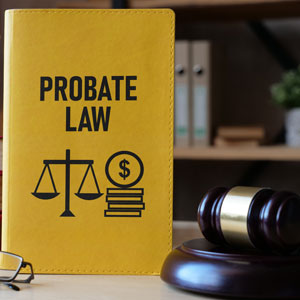
In this article, you will discover: What a small estate affidavit is and how it works in Indiana. The advantages and disadvantages of a small estate. When it’s most appropriate to submit a small estate affidavit What Qualifies As A Small Estate Under Indiana Probate Law In Washington County? A “small estate” does not require formal probate administration through the courts. What is a “small estate?” In the State of Indiana, if the net value of an estate after the payment of liens, encumbrances, reasonable funeral and burial expenses, and the costs of administration, exceeds $100,000, then formal probate administration is required. If it is less than that threshold amount, then assets can be transferred via the “Small Estate Affidavit” under Indiana Code 29-1-8-3. How Does The Small Estate Affidavit…Read More

In this article, you can discover… What happens when multiple heirs inherit the same property. Whether one heir can force the sale of a property against the other heirs’ wishes. How an attorney can help settle disputes between a property’s heirs. What Happens When Multiple Heirs Inherit The Same Property In Indiana? This issue can arise with real estate or personal property, but the discussion will focus on real estate. When multiple heirs inherit the same property, the outcomes depend on whether none of the heirs want the property, only one of the heirs wants the property, or multiple heirs want the property. If none of the children want the property, then the property will be sold, and they will split the net proceeds equally. This can be done as…Read More

In this article, you can discover… Whether heirs have to pay taxes on their inheritance in Indiana. What happens when someone’s estate still owes federal taxes. Whether life insurance proceeds are taxable in Indiana. Do Heirs Have To Pay Taxes On An Inheritance In Indiana? As of 2013, residents of Indiana must only contend with the Federal Estate and Gift Tax and do not have to pay state taxes on anything they inherit. As of 2025, only estates worth $13.99 million or more are subject to this Federal Estate Tax, with estates valued under this amount exempt. Additionally, if the lifetime gifts of an estate exceed the annual exclusion amount for that year, the estate will have to pay federal taxes on the difference; in 2025, the gift tax exclusion…Read More

In this article, you can discover… When a transfer of guardianship may be required. How to begin the process of transferring guardianship in Indiana. How an attorney can help you navigate a time-sensitive guardianship transfer. When Will A Transfer Of Guardianship Be Required? Generally, there are three key players who will be involved in transferring guardianship. The first party will either be a minor or an incapacitated adult who requires guardianship. The remaining two parties will include the appointed guardian and the court, who play equally pivotal roles. A guardian is responsible for overseeing an appointed party and their assets as ordered by the court. The court will determine the terms of the guardianship, but Indiana law states that guardianship is required so long as the party in question remains…Read More

Probate court plays a crucial role in managing the distribution of a deceased person’s assets in Indiana, ensuring that estates are administered properly and according to state laws. Whether there’s a will in place or not, the probate court oversees the process, from verifying the validity of the will to settling any disputes. This guide explains the function of probate court in Indiana and provides an overview of how the process works, giving you clarity on what to expect. In this article, you can discover… The role probate court plays in Indiana and how it oversees the estate administration process. Who should attend probate court hearings and what actions are typically contested. How probate court verifies the validity of a will and handles cases where no will exists. What Is…Read More

In this article, you can discover… What digital assets are, and how to include them in your estate. How to effectively pass on digital assets to your beneficiaries How to manage digital assets during the probate process and an executor. What Is A Digital Asset? Digital assets typically include computer property or digital currencies such as bitcoins or blockchains. Digital assets differ from traditional assets in that, more often than not, these assets are not tangible and take up little to no physical real estate. Some examples of digital assets include: Cryptocurrency: Non-tangible currency such as Bitcoin and Ethereum are defined as digital assets. NFTs (Non-Fungible Tokens): Digital art pieces and virtual real estate items will also be included in an estate’s digital assets. Domain Names: Internet addresses and online…Read More

In this article, you can discover… The differences between formal and informal probate in Indiana. The risks associated with each form of probate. How a probate attorney can help your family navigate emotional conflicts. What Is The Difference Between Formal And Informal Probate In Indiana? It is very important to make the decision between a formal or informal probate process early on. Most estates will be supervised, meaning that permission from the courts is required for any major transactions conducted through the administration process. This can include fee payments, distribution of assets, property sales, and claim settlements. This supervision is put into place to ensure that all parties behave fairly and that the beneficiaries can all receive what they are owed. Alternatively, an unsupervised (or informal) probate process allows for…Read More

In this article, you can discover… The differences between formal and informal probate in Indiana. The risks associated with each form of probate. How a probate attorney can help your family navigate emotional conflicts. What Is The Difference Between Formal And Informal Probate In Indiana? The word “probate” can be confusing because it is used to mean different things depending on the context. When people ask about “formal” versus “informal” probate, they typically are getting at one of two things, either: Whether there will be full “probate administration” required through the court; or Whether estate administration will be “supervised” or “unsupervised.” This is a key determination that can have substantial implications on the course and duration of the transfer of estate assets to the intended beneficiaries. Alternatively, an unsupervised (or…Read More

How Does The Court Determine The Need For Guardianship In Indiana When An Adult With A Disability Is Involved? When determining the need for guardianship for an adult with a disability, the court considers two key factors: 1. Nature And Extent Of The Incapacity Indiana Law bases the guardianship decision on the concept of “Incapacity.” Indiana Code §29-3-1-7.5 defines an “incapacitated Person” as someone who: a) cannot be located; b) is unable to manage their property; or c) is unable to provide self-care, because of insanity, mental illness, mental deficiency, physical illness, infirmity, addiction, incarceration, duress, undue influence of others, and related reasons. The court evaluates the incapacity and how much it affects the adult’s ability to care for themselves. This evaluation should include both the person’s physical health and…Read More

What Is An Emergency Guardianship? When Is One Necessary In Indiana? Emergency guardianship, also known as a “Temporary Guardianship” in the Indiana statutes, is used in extreme situations where the usual safeguards required for a full guardianship cannot be followed due to the urgency of the circumstances. It should be considered a rare course of action; however, some attorneys resort to it as a quick way to get their client’s foot in the door of guardianship to take some sought-after immediate action. Typically, when pursuing a guardianship, various procedures, such as notifying all relevant parties, obtaining consent, and providing medical reports, are mandatory. However, in emergency situations—where there is an imminent threat to the financial or physical health or safety of the person at risk—these requirements may be temporarily bypassed.…Read More